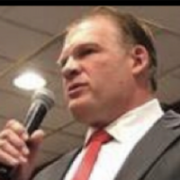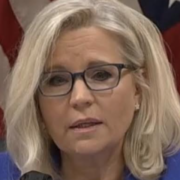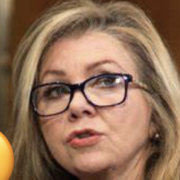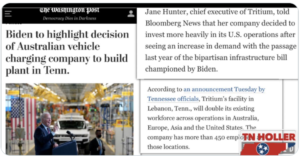OPPORTUNITY KNOCKS. WILL DEMS ANSWER?
The MAGA Civil War Over the H-1B Visas Is a Chance for Dems/Progressives to Re-Establish Themselves As the Party of the American Worker And Drive A Wedge Between Trump And His Base

Trump hasn’t even taken office yet, and his besties are already at each other’s throats. It all started when he named Indian-American Sririam Krishnan, an Elon Musk aide, as Senior Policy Adviser for Artificial Intelligence, and Vivek Ramaswamy let loose with a Twitter post disparaging American workers as he and Elon Musk and the tech oligarchs issued full-throated support of increasing the supply of H-1B Visas to bring in foreign workers.

The Ramaswamy rant was unhinged and ill-advised, and caused an uproar among the MAGA faithful who oppose immigration in any form – some for obviously racist, xenophobic reasons, but also some in genuine defense of American workers, who have been largely left behind by many anti-union anti-worker policies our country has adopted over the years – on both sides of the aisle.
Granted, the story told about H-1B Visas sounds good: We don’t have enough skilled workers in the United States, and we want the best and the brightest, so we allow employers to poach 85,000 skilled workers yearly to come help our companies. Sounds great, right?
But there’s more to the story. As Senator Bernie Sanders says, these Visas are “abused” by tech oligarchs like Elon Musk, and “The main function of the H-1B visa program is not to hire “the best and the brightest,” but rather to replace good-paying American jobs with low-wage indentured servants from abroad. The cheaper the labor they hire, the more money the billionaires make.”
Bernie points out these are not just workers being hired for high level jobs – but also as massage therapists, dog groomers, cooks, etc… as evidenced by the fact that Trump admitted he has them working on his properties when he sided with Elon.

Trump said he hasn’t changed his position on H-1B Visas, but as usual Meidas Touch has the receipts![]() – In 2016 he said it was “very bad for workers” and “I shouldn’t be allowed to use it, we shouldn’t have it”.
– In 2016 he said it was “very bad for workers” and “I shouldn’t be allowed to use it, we shouldn’t have it”.
Elon & the tech bro money changed all that real fast.

That’s why there is actually a progressive, pro-American worker case to be made that Bannon, and Laura Loomer, and other MAGA loyalists have a point about the visas being abused by the oligarchy and the H-1B Visa program needs real reform – a position shared by the AFL-CIO: “Our unions will never accept policies that relegate millions of workers to an exploitable subclass.”
Elon has made it clear this issue is a big reason why he and his tech oligarch buddies helped buy Trump the presidency. A REPORT says “Tesla has replaced some of its US employees who were let go as part of a big wave of layoffs earlier this year with foreign workers using H-1B visas.”

Which is why Elon lashed out so hard at the Bannon crowd over this, calling them “Subtards” and saying he will go to “war” over it, and agreeing people who disagree are “the retarded right” and “unrepentant racists”.

Elon even went so far as to expose his “free speech absolutism” as hypocrisy by censoring conservatives on Twitter.

BANNON responded to Musk by saying “The converts sit in the back… We’re gonna rip your face off… You can’t beat us… we’ll never surrender… If you go low, we’ll go to the center of the earth.”

To which Elon eventually erupted with this “FUCK YOURSELF IN THE FACE” rant…

…and Bannon called Elon a “toddler” ![]()
![]()

Trump’s traveling buddy Laura Loomer even went in on Elon on a spaces, calling him a “liability” for Trump and a “national security threat” because of his ties to foreign governments.

NEWSWEEK calls it a “MAGA Civil War”.

And the headlines roll in.


And despite all that, Trump sided with Elon over his own base.
Money is a helluva drug.
The bottom line is it all creates a very real opportunity for Democrats to stand with Bernie, and the unions, and take up the mantle of defending American workers against the abuse of the H-1B visa system by Elon and the tech oligarchs.
The natural inclination for Dems will be to have an aversion to the idea of opposing legal immigration and siding with Bannon on anything – but to borrow a phrase, there are “not-so-fine people on both sides”. Defending Elon and the tech oligarchs isn’t a great place to be either.
As Bernie says, the system is being abused by the rich and corporations, and the very workers that are feeling left behind and voting for Trump because of it are the ones who are paying the price.
We all know Trump never actually cared about American workers. We all know he is a fraud. Now is a moment where he is showing that to be true.
If Democrats are still the party of American workers that they once were, this is a time to stand up for them.
Granted, it means standing next to, or at least near, the likes of Steve Bannon and others who are doing it with a not-so-subtle thread of racism and xenophobia. But there is a way to support immigration and what it means to this country while also calling for reforms to the H-1B Visa program so that it does not harm American workers by allowing tech oligarchs a supply of indentured servants.
This is an opportunity to show who really has the back of the American worker, and prove Trump never did.
Opportunity is knocking. Will Dems answer?
Please consider chipping in a few bucks to help – make it MONTHLY and get a Holler hat! (or on SQUARE)











































































































































